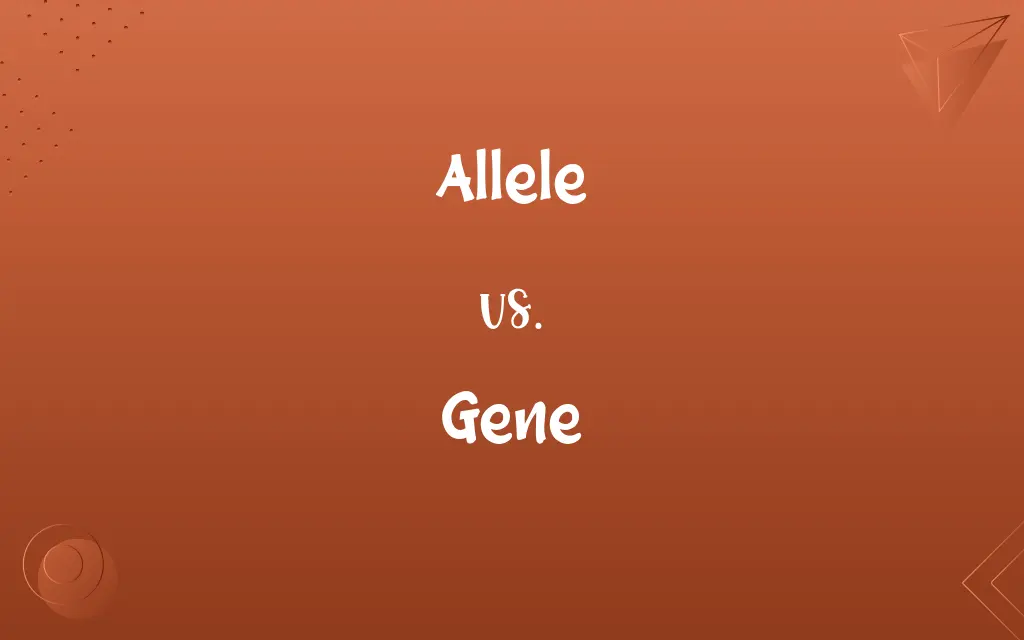Allele vs. Gene: Know the Difference

By Shumaila Saeed || Published on December 29, 2023
Gene is a segment of DNA that codes for a specific protein or function, while an allele is a variant form of a gene that leads to different traits.

Key Differences
An allele is a specific version of a gene, differing in its sequence, that can result in different traits. A gene is a fundamental unit of heredity, representing a segment of DNA that encodes for a protein or a particular function.
Shumaila Saeed
Dec 29, 2023
Alleles can be dominant or recessive, with dominant alleles masking the effects of recessive ones in heterozygotes. Each gene can exist in different forms, known as alleles, which are responsible for variations in inherited characteristics.
Shumaila Saeed
Dec 29, 2023
The diversity of alleles contributes to genetic variation within populations, influencing traits like eye color, hair color, and blood type. The expression of genes can be influenced by environmental factors, altering how traits are displayed.
Shumaila Saeed
Dec 29, 2023
Mutations in alleles can lead to different expressions of a gene, resulting in variations in phenotypes among individuals. Genes play a crucial role in determining the physical and functional attributes of an organism, guiding development and physiological processes.
Shumaila Saeed
Dec 29, 2023
Comparison Chart
Definition
A version of a gene that leads to different traits
A segment of DNA coding for a specific protein or function
Shumaila Saeed
Dec 29, 2023
ADVERTISEMENT
Inheritance
Two alleles per gene, one from each parent
Genes are passed from parents to offspring
Shumaila Saeed
Dec 29, 2023
Variability
Different alleles cause variations in traits
Genes are the basis for traits but do not vary themselves
Shumaila Saeed
Dec 29, 2023
Dominance
Can be dominant or recessive
Genes contain alleles which may show dominance
Shumaila Saeed
Dec 29, 2023
Role in Genetics
Determine specific expressions of a gene
Fundamental units of heredity
Shumaila Saeed
Dec 29, 2023
Mutation Impact
Mutations in alleles lead to phenotypic variations
Mutations in genes can create new alleles
Shumaila Saeed
Dec 29, 2023
ADVERTISEMENT
Contribution to Diversity
Alleles contribute to genetic variation in populations
Genes provide the framework for hereditary traits
Shumaila Saeed
Dec 29, 2023
Expression
Alleles determine the extent of gene expression
Genes can be expressed or silenced
Shumaila Saeed
Dec 29, 2023
Relation to Diseases
Certain alleles are linked to diseases
Genes can harbor mutations leading to disease
Shumaila Saeed
Dec 29, 2023
Allele and Gene Definitions
Allele
An allele is a variant form of a gene.
The allele for blue eyes is recessive compared to the allele for brown eyes.
Shumaila Saeed
Dec 13, 2023
ADVERTISEMENT
Gene
Genes can be influenced by environmental factors.
The expression of genes for plant growth changes in response to sunlight.
Shumaila Saeed
Dec 13, 2023
Allele
Each individual inherits two alleles for each gene, one from each parent.
The combination of alleles from the parents determines the child's blood type.
Shumaila Saeed
Dec 13, 2023
Gene
Each gene can have different forms, known as alleles.
The gene for hair color has several alleles, producing a range of colors.
Shumaila Saeed
Dec 13, 2023
Allele
Mutations can give rise to new alleles.
A mutation in the melanocortin-1 receptor allele can lead to red hair.
Shumaila Saeed
Dec 13, 2023
Gene
Genes determine the characteristics and functions of an organism.
The gene for lactase production affects an individual's ability to digest lactose.
Shumaila Saeed
Dec 13, 2023
Allele
Alleles contribute to the genetic diversity within a species.
Different alleles for a single gene can result in a wide range of hair colors.
Shumaila Saeed
Dec 13, 2023
Gene
A gene is a unit of DNA that encodes a specific protein or function.
The gene for hemoglobin is responsible for oxygen transport in the blood.
Shumaila Saeed
Dec 13, 2023
Allele
Alleles can be either dominant or recessive.
In pea plants, the allele for tall stems is dominant over the allele for short stems.
Shumaila Saeed
Dec 13, 2023
Gene
Genes are located on chromosomes and are inherited from parents.
Eye color is determined by multiple genes inherited from the parents.
Shumaila Saeed
Dec 13, 2023
Allele
Any of the alternative forms of a gene or other homologous DNA sequence. Also called allelomorph.
Shumaila Saeed
Dec 08, 2023
Gene
A hereditary unit consisting of a sequence of DNA that occupies a specific location on a chromosome and is transcribed into an RNA molecule that may function directly or be translated into an amino acid chain. Genes undergo mutation when their DNA sequences change.
Shumaila Saeed
Dec 08, 2023
Allele
(genetics) One of a number of alternative forms of the same gene occupying a given position, or locus, on a chromosome.
Shumaila Saeed
Dec 08, 2023
Gene
(genetics) A theoretical unit of heredity of living organisms; a gene may take several values and in principle predetermines a precise trait of an organism's form (phenotype), such as hair color.
Shumaila Saeed
Dec 08, 2023
Allele
One of two or more alternative forms of a gene that can have the same place on homologous chromosomes and are responsible for alternative traits.
Shumaila Saeed
Dec 08, 2023
Gene
(molecular biology) A segment of DNA or RNA from a cell's or an organism's genome, that may take several forms and thus parameterizes a phenomenon, in general the structure of a protein; locus.
A change in a gene is reflected in the protein or RNA molecule that it codes for.
Shumaila Saeed
Dec 08, 2023
Allele
Either of a pair of Mendelian characters that may occur in an organism as a consequence of variation at one gene locus.
Shumaila Saeed
Dec 08, 2023
Gene
(genetics) a segment of DNA that is involved in producing a polypeptide chain; it can include regions preceding and following the coding DNA as well as introns between the exons; it is considered a unit of heredity;
Genes were formerly called factors
Shumaila Saeed
Dec 08, 2023
Allele
One of two alternate forms of a gene that can have the same locus on homologous chromosomes and are responsible for alternative traits;
Some alleles are dominant over others
Shumaila Saeed
Dec 08, 2023
Repeatedly Asked Queries
Can alleles be identical or different for a specific gene?
Alleles for a gene can be identical (homozygous) or different (heterozygous).
Shumaila Saeed
Dec 29, 2023
What is an allele?
An allele is a variant form of a gene that determines specific traits.
Shumaila Saeed
Dec 29, 2023
Do all genes have alleles?
Yes, most genes have at least two alleles, but some may have more.
Shumaila Saeed
Dec 29, 2023
Can alleles be dominant or recessive?
Yes, alleles can be dominant (their trait is expressed in the presence of another allele) or recessive (their trait is only expressed when paired with another recessive allele).
Shumaila Saeed
Dec 29, 2023
What is the definition of the word "gene"?
A "gene" is a segment of DNA that contains the instructions for producing a specific protein or performing a particular function in an organism.
Shumaila Saeed
Dec 29, 2023
How do alleles affect an organism's traits?
Alleles determine the specific characteristics or variations of a trait that an organism will express.
Shumaila Saeed
Dec 29, 2023
Are all alleles of a gene equally common in a population?
No, some alleles may be more common (wild type) while others are less common due to genetic variation.
Shumaila Saeed
Dec 29, 2023
What is the role of genes in heredity?
Genes are responsible for passing genetic information from one generation to the next and determining an organism's traits.
Shumaila Saeed
Dec 29, 2023
How do genes and alleles relate to each other?
Genes contain the instructions for traits, and alleles are different versions of these genes that can determine variations in those traits.
Shumaila Saeed
Dec 29, 2023
How are genes organized in an organism's genome?
Genes are arranged in a specific sequence along chromosomes within an organism's genome.
Shumaila Saeed
Dec 29, 2023
Can genes mutate?
Yes, genes can undergo mutations, which can result in changes to the encoded protein or the function of the gene.
Shumaila Saeed
Dec 29, 2023
Are genes and alleles specific to humans, or do they exist in all living organisms?
Genes and alleles exist in all living organisms as the fundamental units of heredity and genetic variation.
Shumaila Saeed
Dec 29, 2023
Can genes and alleles be manipulated in genetic engineering?
Yes, genetic engineering techniques allow scientists to modify genes and alleles for various purposes, including medical research and biotechnology.
Shumaila Saeed
Dec 29, 2023
Are genes and alleles the same in identical twins?
Identical twins have the same genes but may have different alleles due to random mutations that occur after fertilization.
Shumaila Saeed
Dec 29, 2023
Can changes in alleles lead to evolutionary adaptations?
Yes, changes in alleles through processes like mutation and natural selection can drive evolutionary adaptations in populations over time.
Shumaila Saeed
Dec 29, 2023
Do genes and alleles always interact in a predictable manner?
While many gene-allele interactions follow predictable patterns, there can be exceptions due to factors like incomplete dominance or codominance.
Shumaila Saeed
Dec 29, 2023
Can genes be inherited independently of their alleles?
No, genes and their corresponding alleles are inherited together as part of an organism's genetic makeup.
Shumaila Saeed
Dec 29, 2023
Are all genes responsible for physical traits?
No, genes can also code for proteins involved in various cellular processes and functions, not just physical traits.
Shumaila Saeed
Dec 29, 2023
Can multiple alleles exist for a single gene in a population?
Yes, some genes have multiple alleles within a population, leading to a range of possible trait variations.
Shumaila Saeed
Dec 29, 2023
How are genes and alleles studied in genetics?
Geneticists use various techniques, including DNA sequencing and genetic mapping, to study genes and alleles and their roles in inheritance and traits.
Shumaila Saeed
Dec 29, 2023
Share this page
Link for your blog / website
HTML
Link to share via messenger
About Author
Written by
Shumaila SaeedShumaila Saeed, an expert content creator with 6 years of experience, specializes in distilling complex topics into easily digestible comparisons, shining a light on the nuances that both inform and educate readers with clarity and accuracy.









































































